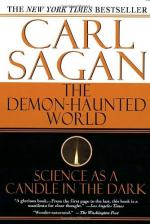
|
| Name: _________________________ | Period: ___________________ |
This test consists of 5 short answer questions, 10 short essay questions, and 1 (of 3) essay topics.
Short Answer Questions
1. What fields did Maxwell make enormous contributions to?
2. According to Benjamin Franklin, what does every age have?
3. What did George Awad create?
4. What may have been the decisive element in the Allied victory in World War II?
5. What advantage does science have over history?
Short Essay Questions
1. What did James Clerk Maxwell achieve?
2. What does Alan Cromer say about the emergence of science? What does Sagan think of this thesis?
3. How are scientists generally portrayed on television?
4. What lessons can be learned from the legal system and applied to matters of politics, economics, religion, and ethics?
5. What is the distinction between science and 'shamanism' or religious doctrine?
6. How does Sagan explain the conflict between our material being and the perceived spiritual world?
7. What great responsibility does science have?
8. According to Sagan, why do we stereotype?
9. What negative traits sometimes exist in skeptics?
10. How is the baloney detection kit used in this chapter?
Essay Topics
Write an essay for ONE of the following topics:
Essay Topic 1
Write an essay about a technology or invention that has had a negative impact upon humanity. Be sure to include:
1) Examples to back up your point.
2) Recommendations on what to do about the technology.
3) Lessons that can be learned from this technology in order to prevent future harm.
Essay Topic 2
Write an essay that argues for or against the censorship of Carl Sagan's ideas based upon their potential to offend readers. Be sure to address:
1) Any concerns regarding freedom of speech/expression, including their limits.
2) Whether or not Sagan's views offend you.
Essay Topic 3
Write an essay that explains why science is important for young students. Be sure to address:
1) Benefits of an early scientific education.
2) Possible negative effects of not having an early exposure to science.
3) Strategies for making science fun for youngsters.
|
This section contains 875 words (approx. 3 pages at 300 words per page) |

|




